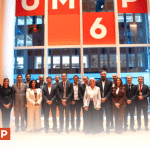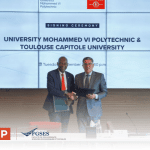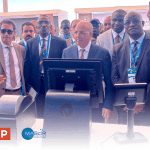UM6P Will provide students spportunities to develop skills Through Virtual Exchange Developed with Support from the Stevens Initiative
UM6P Will Provide Students Opportunities to Develop Skills and Form Friendships Through Virtual Exchange Developed with Support from the Stevens Initiative
Through Stevens Initiative Connected Classrooms, 50 Faculty Members Will Connect Students in Morocco, the United Arab Emirates, and the United States Through Virtual Exchange
The Stevens Initiative announced its second cohort of faculty scholars and university leadership teams participating in Stevens Initiative Connected Classrooms, a program for a select group of institutions dedicated to expanding global education opportunities through virtual exchange. Mohammed VI Polytechnic University will partner with faculty members at Goucher College, Portland State University, Green River College and University of New Mexico to plan virtual exchanges that they will implement in classrooms for the next two years.
Stevens Initiative Connected Classrooms brings virtual exchange experiences to students across Morocco, the United Arab Emirates, and the United States. It supports faculty and postsecondary institution leaders to implement, grow, and sustain these experiences by:
Offering Faculty Capacity Building and Coaching: Connected Classrooms accompanies faculty to effectively implement virtual exchange courses using the Collaborative Online International Learning (COIL) training model.
Providing Institutional Strategic Support and Mentoring: Through a customized approach, Connected Classrooms works closely with the institutions’ leadership to support the growth of virtual exchange at various campuses in a sustainable manner.
Creating a Global Virtual Exchange Community: Connected Classrooms Faculty Scholars and institutional leaders collaborate, learn, and develop best practices.
With its first cohort of Connected Classrooms, Mohammed VI Polytechnic University has been able to run two programs in Fall 2020. The students were able to engage in cross-collaborative projects, allowing them to discover their hidden talents and hone their intercultural awareness. The second cohort of Faculty partners will consolidate the University’s commitment to these valuable global interdisciplinary multicultural exchanges that have proven efficient in sustaining learning despite the pandemic. The lessons learnt during these exceptional circumstances will inform the University’s virtual exchange practice through the pandemic and beyond.
“Stevens Initiative Connected Classrooms program is in line with our University’s vision of preparing leaders of tomorrow, broad-minded youth with global skills and knowledge of foreign languages. We are committed to empowering our students with the necessary tools to thrive in an increasingly interconnected world. As part of this collaborative program, we believe that sharing Best practices in teaching among Faculty members through a positive real-world learning experience will increase their professional value and raise their level of expertise,” said Nadia Aachlouj, Head of Mohammed VI Polytechnic University Language Lab.
In addition to Mohammed VI Polytechnic University, the following institutions are participating in Stevens Initiative Connected Classrooms:
- Agnes Scott College
- Ajman University
- American University in Dubai
- Goucher College
- Green River College
- Mohammed First University
- Mohammed VI University for Health Sciences
- Morgan State University
- National School of Business and Management in Dakhla, Ibn Zohr University
- Portland State University
- Sidi Mohammed Ben Abdellah University
- Sultan Moulay Slimane University
- University of New Mexico
- Zayed University
Over two years, 1,500 students across all 15 institutions in Morocco, the United Arab Emirates, and the United States, including at Mohammed VI Polytechnic University, will participate in a virtual exchange supported by the Initiative under Connected Classrooms.
“At the core of Connected Classrooms is a desire to forge meaningful, equitable partnerships between institutions in Morocco, the United Arab Emirates, and the United States through virtual exchange. While the Stevens Initiative provides the support and framework to make virtual exchange sustained on their campuses, these new institutions – including their faculty, administrators, and students – are collectively championing this effort. They are the true leaders and we’re humbled to partner with them,” said Christine Shiau, Managing Director, the Stevens Initiative at the Aspen Institute.
The Stevens Initiative is an international effort to build global competence and career readiness skills for young people in the United States and the Middle East and North Africa by growing and enhancing the field of virtual exchange. Created in 2015 as a lasting tribute to Ambassador J. Christopher Stevens, the Initiative is committed to helping to expand the virtual exchange field through three pillars of work: investing in promising programs, sharing knowledge and resources, and advocating for virtual exchange adoption.
Mohammed VI Polytechnic University is an institution oriented towards applied research and innovation. The University is engaged in economic and human development and puts research and innovation as a top priority, which enables it to consolidate Morocco’s frontline position in these fields, in a unique partnership-based approach and boosting skills training relevant for the future of Africa. At the international level, the University has woven partnerships with world renowned institutions, which has led to outstanding collaborations for research and innovation. Its culturally diverse campus is designed to foster scientific, cultural, sporting and artistic emulation.
Mohammed VI Polytechnic University’s participation in Connected Classrooms is supported by the Stevens Initiative, which is sponsored by the U.S. Department of State, with funding provided by the U.S. Government, and is administered by the Aspen Institute. The Stevens Initiative is also supported by the Bezos Family Foundation and the governments of Morocco and the United Arab Emirates.
More Information:
The U.S. Department of State’s Bureau of Educational and Cultural Affairs (ECA) builds relations between the people of the United States and the people of other countries through academic, cultural, sports, professional and private exchanges, as well as public-private partnerships and mentoring programs. These exchange programs improve foreign relations and strengthen the national security of the United States, support U.S. international leadership, and provide a broad range of domestic benefits by helping break down barriers that often divide us. Visit eca.state.gov.
The Aspen Institute is a global nonprofit organization committed to realizing a free, just, and equitable society. Founded in 1949, the Institute drives change through dialogue, leadership, and action to help solve the most important challenges facing the United States and the world. Headquartered in Washington, DC, the Institute has a campus in Aspen, Colorado, and an international network of partners. For more information, visit www.aspeninstitute.org.
The Bezos Family Foundation supports rigorous, inspired learning environments for young people, from birth through high school, to put their education into action. Through investments in research, public awareness, systems building and programs, the foundation works to elevate the field of education and improve life outcomes for all children.
The Kingdom of Morocco has held a longstanding commitment to the promotion of peace, mutual understanding and respect across all fora. In line with this commitment, the Government of the Kingdom of Morocco is a strong supporter of the Stevens Initiative and is proud to be included in its programs, which foster opportunities for cross-cultural exchanges between youth.
The Embassy of the United Arab Emirates (UAE) in Washington, D.C. is committed to promoting and increasing cross-cultural understanding and educational exchanges. In line with the UAE Government’s values, the Embassy supports educational programming at schools and universities across the U.S. The Embassy works with U.S. institutions to provide unique opportunities for peer-to-peer exchanges and help broaden student’s horizons.
|um6_wysiwyg|
UM6P Will Provide Students Opportunities to Develop Skills and Form Friendships Through Virtual Exchange Developed with Support from the Stevens Initiative
Through Stevens Initiative Connected Classrooms, 50 Faculty Members Will Connect Students in Morocco, the United Arab Emirates, and the United States Through Virtual Exchange
The Stevens Initiative announced its second cohort of faculty scholars and university leadership teams participating in Stevens Initiative Connected Classrooms, a program for a select group of institutions dedicated to expanding global education opportunities through virtual exchange. Mohammed VI Polytechnic University will partner with faculty members at Goucher College, Portland State University, Green River College and University of New Mexico to plan virtual exchanges that they will implement in classrooms for the next two years.
Stevens Initiative Connected Classrooms brings virtual exchange experiences to students across Morocco, the United Arab Emirates, and the United States. It supports faculty and postsecondary institution leaders to implement, grow, and sustain these experiences by:
Offering Faculty Capacity Building and Coaching: Connected Classrooms accompanies faculty to effectively implement virtual exchange courses using the Collaborative Online International Learning (COIL) training model.
Providing Institutional Strategic Support and Mentoring: Through a customized approach, Connected Classrooms works closely with the institutions’ leadership to support the growth of virtual exchange at various campuses in a sustainable manner.
Creating a Global Virtual Exchange Community: Connected Classrooms Faculty Scholars and institutional leaders collaborate, learn, and develop best practices.
With its first cohort of Connected Classrooms, Mohammed VI Polytechnic University has been able to run two programs in Fall 2020. The students were able to engage in cross-collaborative projects, allowing them to discover their hidden talents and hone their intercultural awareness. The second cohort of Faculty partners will consolidate the University’s commitment to these valuable global interdisciplinary multicultural exchanges that have proven efficient in sustaining learning despite the pandemic. The lessons learnt during these exceptional circumstances will inform the University’s virtual exchange practice through the pandemic and beyond.
“Stevens Initiative Connected Classrooms program is in line with our University’s vision of preparing leaders of tomorrow, broad-minded youth with global skills and knowledge of foreign languages. We are committed to empowering our students with the necessary tools to thrive in an increasingly interconnected world. As part of this collaborative program, we believe that sharing Best practices in teaching among Faculty members through a positive real-world learning experience will increase their professional value and raise their level of expertise,” said Nadia Aachlouj, Head of Mohammed VI Polytechnic University Language Lab.
In addition to Mohammed VI Polytechnic University, the following institutions are participating in Stevens Initiative Connected Classrooms:
- Agnes Scott College
- Ajman University
- American University in Dubai
- Goucher College
- Green River College
- Mohammed First University
- Mohammed VI University for Health Sciences
- Morgan State University
- National School of Business and Management in Dakhla, Ibn Zohr University
- Portland State University
- Sidi Mohammed Ben Abdellah University
- Sultan Moulay Slimane University
- University of New Mexico
- Zayed University
Over two years, 1,500 students across all 15 institutions in Morocco, the United Arab Emirates, and the United States, including at Mohammed VI Polytechnic University, will participate in a virtual exchange supported by the Initiative under Connected Classrooms.
“At the core of Connected Classrooms is a desire to forge meaningful, equitable partnerships between institutions in Morocco, the United Arab Emirates, and the United States through virtual exchange. While the Stevens Initiative provides the support and framework to make virtual exchange sustained on their campuses, these new institutions – including their faculty, administrators, and students – are collectively championing this effort. They are the true leaders and we’re humbled to partner with them,” said Christine Shiau, Managing Director, the Stevens Initiative at the Aspen Institute.
The Stevens Initiative is an international effort to build global competence and career readiness skills for young people in the United States and the Middle East and North Africa by growing and enhancing the field of virtual exchange. Created in 2015 as a lasting tribute to Ambassador J. Christopher Stevens, the Initiative is committed to helping to expand the virtual exchange field through three pillars of work: investing in promising programs, sharing knowledge and resources, and advocating for virtual exchange adoption.
Mohammed VI Polytechnic University is an institution oriented towards applied research and innovation. The University is engaged in economic and human development and puts research and innovation as a top priority, which enables it to consolidate Morocco’s frontline position in these fields, in a unique partnership-based approach and boosting skills training relevant for the future of Africa. At the international level, the University has woven partnerships with world renowned institutions, which has led to outstanding collaborations for research and innovation. Its culturally diverse campus is designed to foster scientific, cultural, sporting and artistic emulation.
Mohammed VI Polytechnic University’s participation in Connected Classrooms is supported by the Stevens Initiative, which is sponsored by the U.S. Department of State, with funding provided by the U.S. Government, and is administered by the Aspen Institute. The Stevens Initiative is also supported by the Bezos Family Foundation and the governments of Morocco and the United Arab Emirates.
More Information:
The U.S. Department of State’s Bureau of Educational and Cultural Affairs (ECA) builds relations between the people of the United States and the people of other countries through academic, cultural, sports, professional and private exchanges, as well as public-private partnerships and mentoring programs. These exchange programs improve foreign relations and strengthen the national security of the United States, support U.S. international leadership, and provide a broad range of domestic benefits by helping break down barriers that often divide us. Visit eca.state.gov.
The Aspen Institute is a global nonprofit organization committed to realizing a free, just, and equitable society. Founded in 1949, the Institute drives change through dialogue, leadership, and action to help solve the most important challenges facing the United States and the world. Headquartered in Washington, DC, the Institute has a campus in Aspen, Colorado, and an international network of partners. For more information, visit www.aspeninstitute.org.
The Bezos Family Foundation supports rigorous, inspired learning environments for young people, from birth through high school, to put their education into action. Through investments in research, public awareness, systems building and programs, the foundation works to elevate the field of education and improve life outcomes for all children.
The Kingdom of Morocco has held a longstanding commitment to the promotion of peace, mutual understanding and respect across all fora. In line with this commitment, the Government of the Kingdom of Morocco is a strong supporter of the Stevens Initiative and is proud to be included in its programs, which foster opportunities for cross-cultural exchanges between youth.
The Embassy of the United Arab Emirates (UAE) in Washington, D.C. is committed to promoting and increasing cross-cultural understanding and educational exchanges. In line with the UAE Government’s values, the Embassy supports educational programming at schools and universities across the U.S. The Embassy works with U.S. institutions to provide unique opportunities for peer-to-peer exchanges and help broaden student’s horizons.
_1.png)


